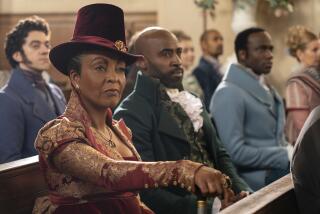Could you work at Downton Abbey?
I would bet you shillings to cents that at least 90% of the people who watch “Downton Abbey,” which returns to these TV shores on Sunday, would rather be the “upstairs” folk, the titled Crawley family, than the “downstairs” population of the maid- and menservants.
Who would want to be obligated to all that groveling and scraping, right?
As it turned out, in the 19th and early 20th centuries, tens of thousands of people did.
PHOTOS: ‘Downton Abbey’ -- Behind the Scenes Hollywood Backlot
For all the subservience, the hand-and-foot tending of people whose birth and wealth evidently made them ill-suited to dress themselves, a life in “service” to a great British family like the Crawleys could be far better than the alternatives.
In a great house, a servant would be guaranteed free room and board (however uncomfortable and occasionally shared the bed was) and a roof over his or her head, decent clothes (even if it was a uniform) and a regular wage.
It was hard work, with long hours, but it had a relatively low rate of death and injury, compared with the abject misery of coal mining jobs and farm jobs and the lowest manual labor. (Remember John Bates, the “Downton” valet, briefly fired because his war injury kept him from doing the job. No workers’ comp in Edwardian England!)
These advantages, which sound so meager now, were nothing to sniff at in the late-19th century economy. This was nothing to sniff at at a time when agriculture, coal mines, the new factories, if these jobs looked comparatively good it’s because the options were often so bad.
For a few decades in late 19th and early 20th century Britain, “service” was the biggest job category around, and the single biggest job description for working women who were lucky enough to avoid tumbling into prostitution.
Servants were supposed to work magic, to lay fires and clean rooms and cook food virtually invisibly. One guidebook of the era laid down rules for upstairs and downstairs. Housemaids, it said, “should make every care and attention never to be observed by you [the upstairs family] doing their duties. If by chance you do meet, you should expect them [the servants] to ‘give way’ to you by standing still and averting their gaze, whilst you walk past, leaving them un-noticed. By not acknowledging them, you will spare them the shame of explaining their presence.”
Sometimes lower servants were even divested of their own names, and would be called by the names of their predecessors, so that the aristocrats wouldn’t have to bother to learn the newcomers’ names.
How did the servants stand it? Remember that this was not the aspirational, upwardly mobile United States. People born into one class were likely to stay there, and encouraged by just about every social mechanism to do so. Education, the great social ladder, was not open to all comers, and such strivings were a source of astonishment if not disapproval.
The beloved hymn “All Things Bright and Beautiful” includes the reproving stanza about ...
The rich man in his castle,
The poor man at his gate,
God made them, high or lowly,
And ordered their estate.”
A Downton maid named Gwen studied in secret and left service to work as an office girl, a “typewriter,” the early name for the person who did the typing. Thomas the footman, in his own louche fashion, tried his hand at the food-staples black market business, and got taken for a ride.
Some of the same independent yearnings show up in “Upstairs, Downstairs,” the “Downton Abbey” of a generation ago. The housemaid Sarah saw herself as a free spirit, even a stage star, not a domestic slave, but her fellow maid Rose couldn’t imagine anything better than the relative comfort and security of life as a servant in a great house.
Career servants in houses like Downton identified passionately with the families they served; the family’s status was their status. The servants lived surrogate lives vicariously through the aristocratic families; they had none of their own. Married servants were rare, and a bit awkward, and married live-in servants with children were unimaginable.
Upper servants enjoyed their own pecking order that, in the phrase of the time, “aped their betters.” The butler and lady’s maid and housekeeper had the best seats at the servants’ table. Lowly maids might have to serve tea to the higher servants the way their upstairs masters were served.
Not all servants were treated anything like decently. Servants in middle-class households, maids-of-all-work, submitted to a dawn-to-dusk drudgery very different from the stratified and specialized servant jobs in aristocratic houses. And wages so low that into the 20th century, even middlingly prosperous families could afford at least one servant
In this country, the rich families of the Gilded Age sought desperately to copy the English aristocracy. That’s one reason that Cora, the Countess of Grantham, is American. The daughters of the plutocracy became “dollar duchesses,” bringing million-dollar dowries to impoverished aristocrats who, in turn, endowed these new-world ladies with old-world titles. It was usually a cold-blooded business. Consuelo Vanderbilt’s mother trained her from childhood to marry well, beating her with a whip when she disobeyed and locking her in her room when she refused to marry the exalted Duke of Marlborough. Once the new duchess had provided her husband with “an heir and a spare,” as she coined the phrase, they went their separate ways and eventually split. It was a diamond-studded tragedy.
Even middle-class Americans had at least one servant. In the 1940s, Emily Post was still writing advice columns about managing in “a servantless house,” and Julia Child’s cookbook was likewise for “the servantless American cook.”
A lot of things changed that: war, labor-saving devices, access to higher education.
The same thing would happen in Britain, too. I haven’t seen the upcoming season of “Downton Abbey” (which has already aired across the pond), but knowing a bit of the history of the age, I can predict that plunging land values, changing labor markets and an altered political landscape will mean a Crawley comeuppance.
But the aristocracy has survived in Britain in some form for centuries. It can be clever and more adaptable than you might think. It might be poor compared with its forebears. Its offspring might be heroin addicts and naff tattooed layabouts. But it is still its lordly self. Don’t count His Lordship out yet.
ALSO:
Facebookers, get over yourselves
California’s new laws: guns, cars, dogs
David Horsey and 2012: The year in cartoons
More to Read
The biggest entertainment stories
Get our big stories about Hollywood, film, television, music, arts, culture and more right in your inbox as soon as they publish.
You may occasionally receive promotional content from the Los Angeles Times.











